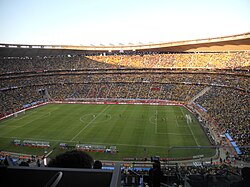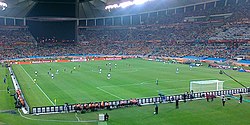| |
|---|---|
 Tournament logo | |
| Tournament details | |
| Host country | South Africa |
| Dates | 19 January – 10 February |
| Teams | 16 |
| Venue | 5 (in 5 host cities) |
| Final positions | |
| Champions | |
| Runners-up | |
| Third place | |
| Fourth place | |
| Tournament statistics | |
| Matches played | 32 |
| Goals scored | 69 (2.16 per match) |
| Attendance | 729,000 (22,781 per match) |
| Top scorer(s) | (4 goals each) |
| Best player | |
← 2012 2015 → | |
The 2013 Africa Cup of Nations, also known as the Orange Africa Cup of Nations South Africa 2013 for sponsorship reasons, held from 19 January to 10 February 2013, was the 29th Africa Cup of Nations, the football championship of Africa organized by the Confederation of African Football (CAF). [1] Starting from this edition, the tournament was switched to being held in odd-numbered years instead of even-numbered years so that it does not clash with the FIFA World Cup. [2] This edition was therefore the first to be held in an odd numbered year since 1965.
Contents
- Host selection
- Libyan withdrawal
- Qualification
- Qualified nations
- Venues
- Host cities
- Training venues
- Match ball
- Mascot
- Draw
- Match officials
- Squads
- Group stage
- Group A
- Group B
- Group C
- Group D
- Knockout phase
- Bracket
- Quarter-finals
- Semi-finals
- Third place play-off
- Final
- Awards
- Tournament rankings
- Goalscorers
- Marketing
- Sponsorship
- Media
- Broadcasting
- References
- External links
South Africa hosted the tournament for the second time, after previously hosting the 1996 African Cup of Nations. The 2013 tournament is the highest attended edition of the Africa Cup of Nations under the 16-team format. The South African team was eliminated in the quarter-finals by Mali, following a penalty shoot-out. Zambia were the defending champions, but were eliminated in the group stage.
Nigeria won its third Africa Cup of Nations championship with a 1–0 victory over Burkina Faso in the final. Nigeria participated in the 2013 FIFA Confederations Cup in Brazil as the representative from CAF. [3]






